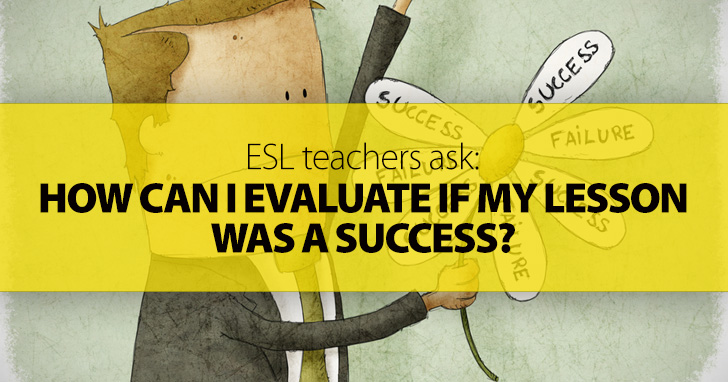“I can tell when I’ve taught a particularly good lesson or if a class was a complete disaster, in general terms. But is there a more specific way to evaluate the success of a lesson?” *
This question brings up a very valid point. Most of us know what it’s like to feel good about the way a lesson went. We can tell when we’re headed in the right direction. On the other hand, we may easily identify things that went wrong. We may even be able to rate a particular lesson on a scale of one to ten. But is this enough to truly rate the success of your lesson? Not really. Evaluating a lesson is a lot more complex than that. You need to consider a number of things. Ask yourself a series of questions. You may think your lesson was a resounding success, but here’s how you can truly know.

Evaluate Your ESL Lesson – Ask Yourself
-
1
About the Preparation:
- How hard was it to plan this lesson? What made it easy/hard to plan?
- Were you able to follow your lesson plan? Did you have to make any unplanned changes? Did you discard it completely? How useful was the lesson plan?
- What changes would you make to your lesson plan for the next time you teach this lesson? What activities would you add/take out?
- How hard was it to gather the materials you needed? What made it easy/difficult/time-consuming to find the right worksheets, videos, games, toys, realia, etc…?
- How useful were the materials you planned to use? Did you use all of the material? If not, why did you choose not to use it?
- Would you use the same materials next time? What would you change?
-
2
About the Lesson Itself:
- Did you set the lesson goal(s) at the start of class?
- Which activity/part of the lesson worked particularly well/was very well executed?
- Which activity/part of the lesson did not work so well/was not well executed?
- Which activity/part of the lesson was particularly difficult/challenging for you?
- Which activity/part of the lesson was rather easy for you?
- Did you manage to keep all/most of the students engaged?
- Which tools (blackboard/whiteboard/smartboard/TV/video/computer/etc) did you use? Were they effective in getting your point across?
- Did you practice reading, writing, listening and speaking? Which did you practice more?
- Did you speak only English? How much of the students’ native language did you speak? If you spoke your students’ L1, could it have been avoided? How?
- Do you think you taught this lesson better than how you taught it before? If not, why?
- Did you confirm the lesson goal(s) at the end of the lesson? Did your students successfully achieve the goal(s)?
- Did you assign homework at the end of the lesson? Why or why not?
-
3
About Your Students:
- Were any of the activities/tasks too easy for your students?
- Were any of the activities/tasks too difficult?
- Which activities/tasks did they enjoy the most?
- Were there any problems regarding behavior? If so, which? How did you deal with them? How can these types of problems be avoided in the future?
- Did all of the students participate actively? If there were any who did not participate, what aspects of the lesson do think failed to engage them?
- Did all of the students meet the lesson goal?
- Can you pinpoint specific problems that some students had during the lesson? (comprehension, pronunciation, fluency, etc…)
This kind of self-evaluation comes in handy after a particularly difficult lesson. It helps you pinpoint what went wrong and makes it easier to come up with better alternatives to some activities or tasks that were not as effective as you thought they might be. But you might also want to ask yourself these questions after a lesson that was a huge success. A thorough self-evaluation should give you insights into things you might want to replicate in future lessons.
Why Self-Evaluate?
We’re all familiar with student assessment. We’re prepared to evaluate every tiny aspect, from student fluency to pronunciation. Every now and then, however, we need to look to ourselves and evaluate all of the aspects of a lesson, both the good and the bad. If you make self-assessment a routine, you’ll soon see patterns developing and discover where your strengths and weaknesses lie. You might see, for example, that you’re not particularly comfortable teaching writing or that it’s an area that your students seem to struggle with. Some weaknesses you may try to improve on your own, while others may require teacher training. If you identify your strengths, on the other hand, you’ll have an arsenal of tried and tested strategies you can always turn to. Whichever way you look at it, a self-evaluation of your lessons is a win-win, for you and your class.
It’s a lot easier for us to focus on what went wrong and berate ourselves for not doing better.
Which is why it’s also very important to analyze what did work out very well. So be sure to pat yourself on the back every now and then for a job well done. Don’t dwell on past mistakes. Learn from them. And recreate your successes.
* This question was sent in from a real ESL teacher, just like you! If you need any advice on a particular topic, share your question in the comments below. Or tweet your question to @busyteacher_org with the hashtag #ESLTeachersAsk. Your question might get picked and featured in an article!
P.S. If you enjoyed this article, please help spread it by clicking one of those sharing buttons below. And if you are interested in more, you should follow our Facebook page where we share more about creative, non-boring ways to teach English.







